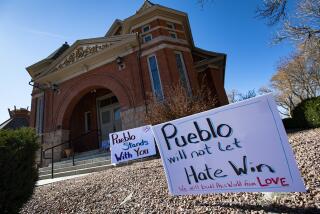Blasts Won’t Shatter Turkey’s Ties to West
- Share via
BETHLEHEM, Pa. — Twice in one week this month, Turkey’s cultural and business capital, Istanbul, was rocked by a twin set of bombings. The destruction and death shocked Turkey’s public and its leaders, but what sadly surprised them was that the bombers were thought to be Turkish citizens. Despite its troubled history with Kurd-inspired terrorism, Turkey had never experienced any attacks of this magnitude. Yet, if the terrorists intended to drive Turkey away from its Western allies, they will fail.
Some have speculated that Turkey was targeted because of its close links to the United States and Israel. Others have blamed the war next door in Iraq. Although the bombings have the potential to affect Turkish politics and policies, one should not look for a profound message in what has all the trappings of an Al Qaeda operation. The terrorist organization has made no secret of its desire to kill Americans, Jews and their supposed allies.
The attacks on two synagogues and British assets in Turkey were patterned after Al Qaeda bombings in other Muslim countries. A synagogue in Tunisia was hit in April 2002, and Jewish and Spanish institutions were targeted in Casablanca, Morocco, in May. Also not new in the attacks in Turkey was the terrorists’ willingness to shed Muslim blood to achieve their goals. Saudis and Indonesians have been killed by truck bombs.
Beyond its immediate goal of killing as many adversaries as possible, Al Qaeda wants to demonstrate that it can act in any place and at any time of its choosing. Under pressure from a coalition of countries, with some of its leaders in hiding and others in custody, and its funding disrupted, the organization needs to prove that it is still a force to contend with. By employing locals, it also wants to show that it has deep roots and support.
But the fact of the matter is that the two synagogues and the British institutions were largely targets of convenience. They were relatively easy to reach, despite many security precautions. The U.S. Consulate, which once was not far from either of the synagogues and the British Consulate, was moved in June to an area more secure than the narrow city streets where the targets were.
If Al Qaeda sought to sow uncertainty and division, it miscalculated. The moderate, pro-Islamic Turkish government’s response, so far, has not distinguished between Jewish and Muslim victims. It has even put on the defensive some hard-core and radical Islamists in Turkey, including some in the ruling party, as they tried to explain away these horrendous events.
The local Islamic radicals have, as usual, blamed the CIA and Mossad, the Israeli intelligence service, for the attacks. Most Turks, however, even if unsympathetic to the United States in the Iraq war, understand that Al Qaeda and its firebrands are responsible. The bombings present the Turkish government with an opportunity to isolate the Islamic radicals who have been a weight on its shoulders.
Still, the bombings revealed Turkey’s vulnerabilities. The bombers struck at a time when the Turkish economy was just starting to recover from years of mismanagement and its worst postwar economic crisis. Business confidence and the all-important tourism industry will be hurt. Both the U.S. State Department and the British Foreign Office issued travel advisories after the attacks.
(My university was planning a student and faculty trip to Turkey in May. After the synagogue attacks, we decided not to be deterred from our trip. But after the second wave of bombings, we chose a different destination. How many more institutions have made similar choices?)
Turkey can economically ill afford another round of terrorist violence. For more than a decade, it has served as a haven and transit point for Middle Easterners, Pakistanis and even Africans who wanted to go on to Europe. It’s also an ideal environment into which Al Qaeda can infiltrate its operatives. Turkish security services are adept at tracking home-grown leftist, Kurdish and even Islamist terrorists, but they are unprepared to handle the influx of hundreds of thousands of transient foreigners.
Turkey’s economic and security vulnerabilities will force it to work more closely with the European and American governments. The bombings have thrust Turkey onto the front line of the war against terrorism, where it will need greater intelligence and logistical help in combating Al Qaeda elements in its midst. Europeans should not hesitate to supply whatever assistance is needed. Luckily, Europe has experienced few acts of Al Qaeda-related terror, but it would be foolhardy to think that, after Istanbul, any place is safe anymore.
More to Read
Sign up for Essential California
The most important California stories and recommendations in your inbox every morning.
You may occasionally receive promotional content from the Los Angeles Times.












